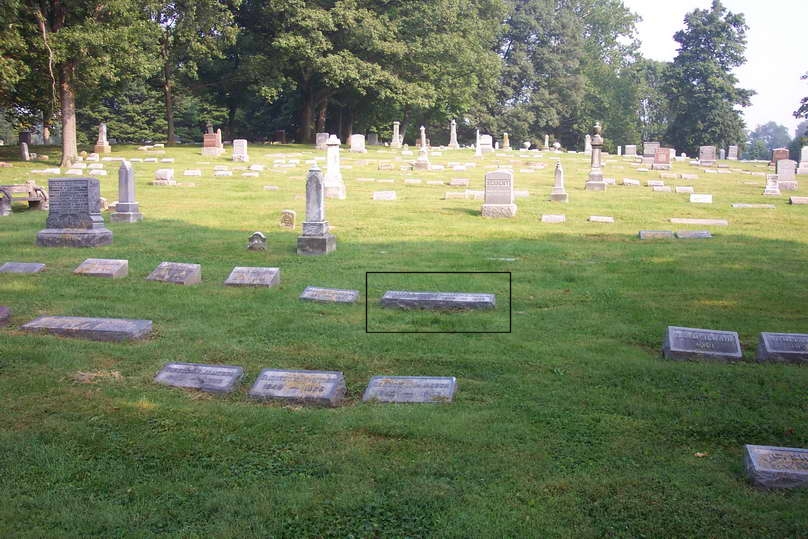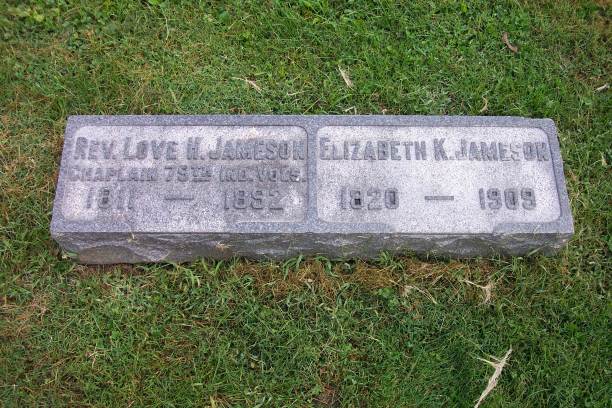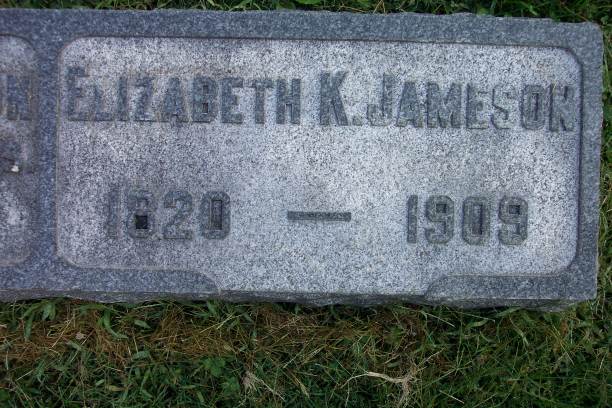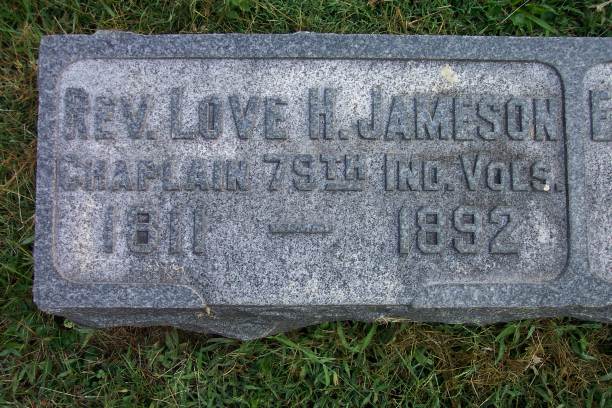Love Humphreys Jameson
1811-1892
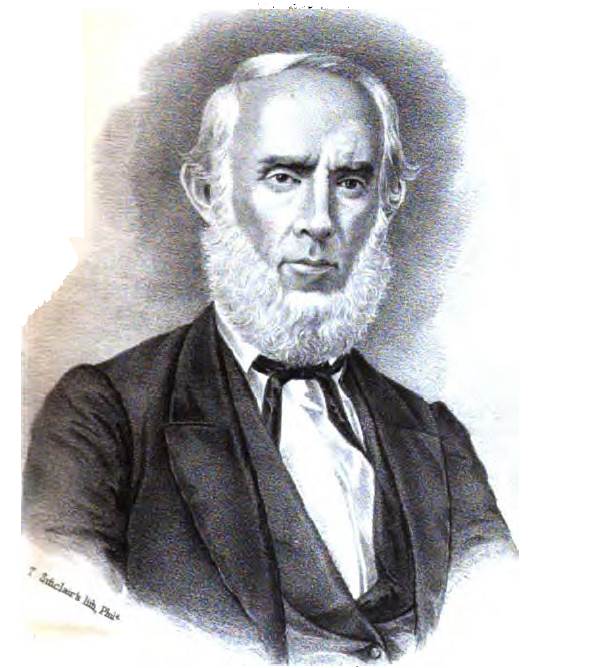
![]()
Love H. Jameson
This distinguished pioneer was born May 17th, 1811, in Jefferson county, Indiana Territory. His parents were both natives of Virginia, whence they emigrated to Kentucky, his father in 1795 and his mother in 1803. Soon after their marriage they again turned their faces toward the Northwest, and in the Fall of 1810 settled for life on a creek called Indian Kentucky, in the county and Territory aforesaid.
His father, Thomas Jameson, was born of parents who were members of the Kirk of Scotland, consequently he was sprinkled in infancy and trained up a Calvinist in the strictest sense of that term. His mother's parents held the views of the Church of England, but for some cause she was not christened according to the usages of that church. By some means she had imbibed the doctrine of Arminius, and was, therefore, directly opposed to her husband on the subject of religion.
But united in heart and fortune, they soon came also to "the unity of the faith and of the knowledge of the Son of God." In the year 1816, by the hand of John McClung, a young coadjutor of B. W. Stone, they were immersed into the Lord Jesus and became members of the old Christian Church.
In the Spring of 1818 the father of Love H. chanced to form the acquaintance of Mr. Joseph Bryant, a brother-in-law of Alexander Campbell. From Mr. Bryant he heard for the first time of Mr. Campbell, and of the changes he recommended in the return to the "ancient order." Soon after he received a pamphlet published by Thomas and Alexander Campbell, in which was presented at length "The Basis of Christian Union." This pamphlet was published in 1809, three years before its authors withdrew from the Presbyterian Church. With its contents Mr. Jameson was well pleased, and would gladly have read more from the same source; but from that time be heard no more of the Campbells, or of the Reformation until the year 1826.
Among the first religious impressions made upon the mind of Elder Jameson was a profound respect for the Holy Scriptures. Many portions of them he committed to memory at a very tender age, and their declarations he was taught to regard as an end of all controversy. In a word, he was carefully trained up "in the way he should go," and now that he is old he has not departed from it.
His education was attended with all the difficulties incident to frontier life. There were but few schools, and they were conducted by incompetent "masters." His first teacher, especially, still holds a place in his memory as an inexorable tyrant. It was, perhaps, a blessing that the sessions were short and at long intervals; for had he been kept long under such instructors, be might have been characterized in after life by a hatred rather than a love of literary pursuits.
It was a happy necessity that kept him the greater part of his time under the tuition of his kind parents, who used due diligence in the education of their children, especially their first Love. Before he was three years old they purchased for him a primer, and by the help of its pictures he soon became familiar with the names of the letters. This done, the advance to spelling and reading was easy and rapid.
In penmanship he certainly enjoyed the disadvantages of a "new system." With a rude pencil of his own manufacture, he executed the characters on linden slabs; nor were these implements displaced by pen, ink, and paper, until he had learned to write a legible hand. This he soon accomplished; and by the time he was seven years old he was so good a scribe, that when his first teacher came round with the "Article," he had the honor of signing his father's name to that instrument.
From 1818 to 1828 he attended school each Winter; and each Summer assisted his father on the farm. His principal study, during that time, was Arithmetic; no attention being paid to English Grammar, because it was the prevailing opinion that it was calculated only "to make fools of the children." The teachers readily encouraged the popular prejudice against a subject of which they themselves were grossly ignorant. Geography was then an "untaught question;" and as for Algebra, had its name been mentioned, those simple pioneers might have mistaken it for that of the striped horse (Zebra), or some more terrible "varmint." Still, what little was taught he learned; and, in addition to that, he spent his leisure hours at home in reading every book and paper upon which he could lay hands. "Weems' Lives of Washington and Marion," "The History of the Twelve Caesars," an old "History of London," and a stray copy of "Morse's Geography," containing numerous historical accounts, were read and re-read until he could repeat many portions of them from memory. The historical portions of the Old Testament, also, especially those relating to the deliverance and subsequent wars of the Israelites, were made as familiar as the tales of the nursery.
Aside from his progress in other matters, he, at an early age, displayed a remarkable talent for music; and in the former days of his ministry, he was prominent among the sweet singers of the Reformed Israel.
In 1826 his father commenced taking the "Christian Baptist." This opened to him a new field; and, with respect to the whole family, this was the beginning of a new era. He longed for the coming of every number; and when it came, it was his happy privilege to read it through in the hearing of his parents and any friends that might happen to be present.
The information received from this source, together with the knowledge derived from his early reading of the Scriptures, made him quite a formidable disputant in the private discussions of those times. These were of frequent occurrence; for Beverly Vawter was already presenting, with clearness and boldness, the distinctive features of the Reformation, while all his fellow-preachers, and many of the common people, were bitterly opposing him.
Thus things went on until the Fall of 1829. In September of that year a protracted meeting was held on Indian Kentucky, near the residence of Thomas Jameson, at which place it had been customary to hold a meeting each Fall, for the last ten years. There being no houses of worship, the people assembled by day in the groves, and, at night, there was usually preaching at several different cabins in the neighborhood. On Monday of the present meeting it was noised abroad that on the night before several persons had "got religion" at the house of an old brother Eccles. This intelligence threw the whole community into an uproar.
For some time previous to that the Reformers had rather outnumbered those who held fast the traditions of the fathers; but, the event of the preceding night being known, a great many rallied under the orthodox banner, and, for a single day, restored that party to the ascendancy. They controlled the meeting; they preached; they invited mourners to the altar; and had the satisfaction of seeing many "converted." About noon the great assembly repaired to the water, songs being sung all the way. On the bank of the stream Elder Jameson confessed the Saviour, and was straightway immersed by one who understood, as well as himself, the design of the ordinance.
From this time forth there was great religious excitement in that region. But the way which they called heresy, gradually gained ground despite the most obstinate resistance. Elder Jameson took a prominent part in every social meeting; and it was soon insinuated that he had a talent for preaching, and that the command was to "occupy." Especially did Elder Vawter, and an aged brother McMillan, urge him to do the work of an evangelist. Yielding to their importunities, he consented; and on the evening of December 25th, 1829, he preached his first discourse. From that time to the present, a period of thirty years, he has been constantly before the public.
During the greater part of the year 1830 he was engaged in teaching, principally for the benefit of his younger brothers and sisters. While thus employed he prosecuted diligently the work of self-instruction; and having acquired a pretty good knowledge of his mother tongue, he began the study of Greek. In this, his first text-book was Ironside's Grammar, which, in his judgment, was most appropriately named. It was written in Latin, and to acquire a knowledge of either language he had to first understand the other. He was, therefore, in much the same predicament as those who are taught that they cannot obtain faith until they pray for it, while at the same time they cannot pray acceptably without faith! Yet by the aid of lexicons and of his teacher, he penetrated, in places, even Ironside; and was soon able to read the New Testament in the original Greek.
In the mean time he and Elder Vawter continued to hold meetings at various points in Jefferson and the adjacent counties, baptizing not a few.
In the Fall of 1832 he visited New Castle, Georgetown, Clintonville, and other points in Kentucky. On this tour he made the acquaintance of Elders F. R. Palmer, John Smith, John Rogers, J. T. Johnson, and other distinguished pioneers of that State, from whom he received many valuable suggestions relative to the work of the ministry. Returning home, he again engaged in teaching, still preaching regularly, however, and immersing many, among whom were several of his pupils.
In the Spring of 1833 he visited Rising Sun, where he made arrangements with D. D. Pratt, the Principal, to spend the Summer and Fall in the seminary at that place. This he did, studying chiefly English Grammar, Algebra, Rhetoric, and Greek. During his connection with this institution he defrayed his expenses by instructing the preparatory classes. He also preached regularly for a congregation some distance in the country; and under his labors quite a number were added to the little church. From the very first he seems to have cast the net on the right side of the ship.
This was the last school he ever attended; but he has been, through life, a diligent self-instructor, and has worked his way up to an honorable rank among the educated men of the church. In the natural sciences, especially, he is quite proficient; and notwithstanding the difficulties under which he began the study of Greek, he has, by perseverance, acquired a critical knowledge of that language. His literary character was such, in general, that, in 1859, the Board of Directors of the N. W. C. University, on the recommendation of the Faculty, conferred on him the honorary degree of A. M.
Leaving the seminary in November he returned to his father's, and once more engaged to teach during the Winter. This, his last school, closed in March, 1834, and he immediately began to make preparations for devoting himself entirely to the ministry as a life work. His father fully set before him the difficulties and privations he would have to encounter as a preacher of the gospel; but he still adhered to his purpose, while he looked not at the things which are seen and temporal, but at the things which are not seen and eternal.
On the first day of April, 1834, he bade adieu to home and friends, and set out for Ohio. His first appointment was at Rising Sun, from which place he proceeded to Cincinnati by way of Burlington, Ky. Late in the evening he crossed the river at Covington, and found himself alone in the busy throng of the young Queen of the West. He soon found his way to the house of a brother T. Murdock, who extended to him Christian hospitality. Having tarried here a few days, he proceeded to Carthage, where he renewed an acquaintance, previously formed, with Walter Scott. Together they held several interesting meetings, and finally went to Harrison, on the State line, to fill an appointment for John O'Kane. There they met with Elder Carey Smith of Indianapolis, from whom they learned that all the churches of the town were closed against them, and that they would be under the necessity of holding the proposed meeting in a barn some two miles up White Water.
After a hasty meal the trio set out for the said barn, where they found only about thirty persons assembled. Walter Scott was greatly discouraged, and without ceremony rolled himself up in his great cloak, stowed himself away in a hay mow, and went to sleep. The burden of the day, therefore, devolved on the two wakeful preachers. Smith delivered an able discourse; Jameson followed with a fervent exhortation; and several persons came forward to make the good confession. At this juncture Elder Scott came hurriedly out of his snug retreat, and, without stopping to remove the bits of hay from his raven locks, joined in the exercises with hearty good will.
As the sun was going down they returned to the village, and repaired to the river to attend to the ordinance of baptism. A great concourse of people were present, and among them a local preacher by the name of Lincoln, who fearing an invasion of the Methodist Zion, determined to offer battle at the water. Elder Scott immediately took his position on a large boulder, and commenced replying to Mr. Lincoln's questions. His faithful co-laborers took their positions around him, Testament in hand; and as soon as Mr. Lincoln would put a question they would turn to the passage containing the proper answer, and hand it up to Elder Scott, who would read it aloud, making such comments as he deemed pertinent. This done, all were ready for another question and another reply. Thus, until the enemy was silenced, raged the Battle of White Water, fought with weapons "not carnal but mighty through God to the pulling down of strong holds." By the singular contest an intense religious interest was awakened in the whole community. From that time till the close of the meeting the "barn" was filled to overflowing; and before they left the town a goodly number had been added to the saved.
This was the beginning of the Harrison church, which was organized in July following with over forty members.
In the mean time Elder Jameson had engaged to preach for the churches at Carthage, Cumminsville, and White Oak. His labors at each of these points were attended with great success.
In the month of June he assisted Elders Walter Scott, J. G. Mitchell, and Guerdon Gates of Kentucky, in a protracted meeting at Dayton, Ohio. This proved to be a kind of city of Samaria; the gospel met with a cordial reception; and many were brought to the knowledge of the truth and the obedience of the faith.
From Dayton, Elder Jameson visited Harrison, Rising Sun, Vevay, and other points in Dearborn, Ohio, and Switzerland counties. At Vevay he engaged in his first and last public discussion. His opponent was the Rev. John Pavy of the Regular Baptist church.
During the Fall and Winter of 1834 he continued to preach at various points in Hamilton county, making occasional visits to Dayton, and one to Wilmington, where he became acquainted with Dr. Matthias Winans, a distinguished correspondent of the Evangelist and Millennial Harbinger.
Early in the Spring of 1835 he revisited Kentucky, in company with Walter Scott. They preached at Georgetown, and at several places in Scott and Woodford counties, including Versailles, Paris, and Lexington. Of course they did not fail to visit Ashland, where they spent several hours with Mr. Clay under his old-fashioned but hospitable roof.
On returning to Ohio he found letters urging him to assume the pastoral care of the church at Dayton. This call he accepted, and in June, 1835, removed to that city. Soon afterward he visited Connersville, Indiana, where he assisted John O'Kane in a protracted meeting. Together they then went to Rushville, and thence to Indianapolis, then an insignificant town of a few hundred inhabitants, having not a single railroad, and consequently as little communication with the rest of the world as Jerusalem had with Samaria. Bespattered with mud, and wet as a drenching rain could make them, they entered the courthouse where a few persons had assembled; and soon forgot the sufferings of this present time in contemplating the glory that shall be revealed hereafter. At this meeting Elder Jameson met, for the first time, John L. Jones, P. M. Blankenship, Butler K. Smith, and other pioneer evangelists.
Returning to Dayton, he continued his pastoral labors with the most encouraging results. The church at that place, thinking themselves unable to sustain weekly preaching, permitted him to spend a portion of his time in the service of congregations abroad. Under this arrangement he visited, during the remainder of that year and the next, the churches at Fairfield, Wilmington, Maysville, Mayslick, Minerva, Carthage, Harrison, Connersville, Rushville, Greensburg, Indianapolis, and other points in Ohio, Indiana, and Kentucky. His principal co-laborers were D. S. Burnet, Walter Scott, John O'Kane, and R. T. Brown. In pairs and trios they journeyed about on horseback, holding here and there what were literally "big meetings," for they usually continued several days, and resulted in the salvation of many.
In the Winter of 1837 he attended the Campbell and Purcell debate, at Cincinnati; and took part in the long series of meetings which followed that exciting discussion.
In April of the same year he resigned his charge at Dayton, and returned to his old, first field at Carthage, where he found a true yoke-fellow in the person of Dr. L. L. Pinkerton. While at this point he also preached regularly for the churches at White Oak, Burlington, Mount Pleasant, and Harrison. He made one tour through Rush and Fayette counties, Indiana, and one through a portion of Kentucky.
In December, 1837, he was married to Miss Elizabeth M. Clark, a woman of such excellent spirit that she was soon counted worthy to appear in the society of the blest.
For the next two or three years he continued to travel and preach as formerly, being present, in the Winter of 1839-40, at the great meeting in Cincinnati, which continued one hundred days.
At this time he was passing, had well nigh passed, the happiest days of his life. Shortly afterward Walter Scott and Dr. Pinkerton removed to Kentucky; some old friends emigrated to the West; others died; and their happy circle in which he had been wont to move, was sadly broken. Under such circumstances he was no longer content with his field of labor. Like the lone Indian who snapped his bow-strings, threw them on the burial-place of his fathers, and departed toward the setting sun, he left with a sad heart the scenes of his joys and griefs in Ohio, and journeyed westward to Indiana.
This general emigration of evangelists was a severe blow upon the cause of reform in Ohio. At that very time, if ever, there was need of united and untiring effort. All that rich and populous region west and north of Cincinnati was stretching out its hands for the ancient gospel, and, by proper exertion, might have been brought under its influence. But the golden opportunity was suffered to pass unimproved, and the field that was ripe for the harvest was never reaped.
In May, 1840, he rested once more with his little family beneath the paternal roof. His first work on returning to Indiana was to revisit the churches for which he had been wont to preach in his youth. This being done, he constantly extended his field of operations, until he had published the ancient gospel in nearly all the cities and villages of the southeastern portion of the State.
In some of these places he received a small pittance for his labors; but, in the majority of them, he received nothing. He therefore knew "how to be in want," though he knew not "how to abound." At no period of his ministry has there been reason to suspect that Elder Jameson was following the Saviour for "the loaves and fishes." During his sojourn in Ohio he never received more than four hundred dollars per annum; and the debts he was compelled to leave unpaid, added not a little to the heaviness with which he left that State. It was only by rigid economy and stern self-denial that he satisfied those old claims, and thus kept the command to "owe no man anything, but to love one another." Since his return to Indiana his abundant labors in the gospel have afforded him a bare support; and pecuniary embarrassments that were present in his youth, are robbing him of the ease and tranquility that should accompany old age.
In May, 1841, Elder Jameson located in Madison as pastor of the congregation in that city. The year opened with bright prospects, but it closed in the deepest gloom. At the close of a beautiful day in June, his wife was walking in the garden, apparently in perfect health; and while thus engaged, she was suddenly seized with an apoplectic fit, and almost instantly expired.
After this sad bereavement, he continued his pastoral labors in Madison until the Fall of 1842. In the mean time he made an extensive tour through the Wabash country, including the cities of Terre Haute, Crawfordsville, Lafayette, and Indianapolis.
At the close of the meeting in Indianapolis, he was invited to take charge of the church in that city. This invitation he accepted; and on the 5th of October, 1842, he entered upon the duties of his new pastorate. Before leaving Madison, however, he was again married, to Miss Elizabeth K. Robinson, of that city.
In September, 1843, he accompanied Elder B. W. Stone and others to the Illinois State Meeting, which convened that year at Springfield. After its adjournment, he spent a month in visiting important points in the Prairie State.
In 1845, the State Meeting, which met at Columbus, Indiana, appointed him and Elder John O'Kane to evangelize in the southwestern part of the State. To this mission they devoted the Summer of that year, doing what they could to extend the Redeemer's kingdom, in the midst of the excitement produced by the national difficulties with Mexico.
For several years subsequent to this date he was employed, partly by the church at the capital, and partly by congregations in the vicinity.
Since 1854, he has preached but little in Indianapolis, but he has continued to reside there, laboring incessantly, elsewhere, in word and doctrine. He keeps up his regular monthly appointments at some four different churches; and availing himself of the excellent facilities afforded by the numerous railroads centering at that place, he publishes the glad tidings throughout the entire Commonwealth. Even state lines do not circumscribe his influence; for, in the last few years, he has visited Ohio, Kentucky, Western Missouri, Illinois, New York, and portions of New England.
From first to last he has been successful in his ministry; and the Lamb's book of life will reveal many a name written therein through his instrumentality.
In the personal appearance of Elder Jameson there is but little indicative of the hardy pioneer. Aside from his silvered locks and patriarchal beard, he exhibits but few signs of old age. His cheek is but slightly furrowed; his black, restless eye has lost none of its youthful fire; and he who has known him for a score of years can scarcely detect any loss of grace or elasticity in his step. He weighs about one hundred and forty-five pounds; is about five feet nine inches high, rather slender, and as straight as an Indian.
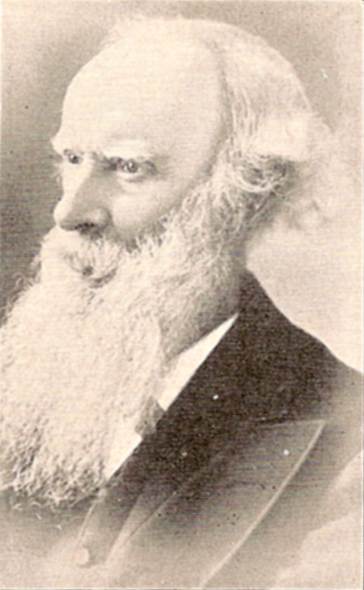 As he has risen by his own efforts from
the humbler to the higher and more refined circles, he has departed from the
style of dress, and, somewhat, from the plain and simple manners of the former
days; on which account, some, who adhere to the simplicity of the olden time,
think him proud. But he is easily approached, uniformly courteous, and always
sociable, unless his attention happens to be engrossed with some particular
subject.
As he has risen by his own efforts from
the humbler to the higher and more refined circles, he has departed from the
style of dress, and, somewhat, from the plain and simple manners of the former
days; on which account, some, who adhere to the simplicity of the olden time,
think him proud. But he is easily approached, uniformly courteous, and always
sociable, unless his attention happens to be engrossed with some particular
subject.
With regard to intellectual ability and scholarship, he is considerably above mediocrity. In the main his researches are extensive rather than deep; yet he is not superficial, and on some subjects he is decidedly original. In biblical criticism, especially, he has evinced greater acumen than many who eclipse him in reputation.
He has not written extensively for the public, but has for many years contributed sparingly to the Christian Record, Millennial Harbinger, and other organs of the brotherhood. It costs him much labor to write for the press; for he composes slowly and with great care; and his manuscript, before it leaves his hand, must be in appearance altogether unexceptionable. It may be on this account that he has not been a more frequent contributor. His prose essays certainly compare most favorably with the productions of many whose names, in full, appear almost weekly in some of the religious papers. Though he does not claim to be a poet, he has written some very respectable hymns, a few of which have recently appeared, over his initials, in "The Weekly Christian Record."
As a pulpit orator he occupies an honorable rank among the preachers of his day. He has an excellent voice; his elocution is earnest and emphatic; in gesture he is free and natural, in language chaste and copious. In speaking he holds his head in a rather elevated position, and turns it about in a peculiar manner, by which alone he would be easily recognized were he, in other respects, completely disguised. Some censorious critics think him somewhat wordy, desultory, and given to repetition. If so, it is not because he lacks ability to be concise and logical; but because he has preached so long and become so familiar with every portion of the Scriptures that he has suffered himself to fall into the habit of speaking without previous preparation. In this particular he is by no means a sinner "above all others", the fault is as common as it is grievous. He is a bold and uncompromising defender of the truth, yet he is not disputatious or dogmatical. His discourse is generally designed to point out the path of duty to saint and sinner, or to expound some difficult passage of Scripture.
As a Christian he is without spot and blameless. In the congregation, in his family, in the round of mirth, in the house of mourning, in every relation of life, his demeanor is "as becometh the gospel of Christ."
Having been from his youth under the influence of that wisdom which has "in her left hand length of days," his willing spirit is not yet fettered by any serious infirmity of the flesh. On the contrary, he is still vigorous and active in the ministry, though
"The morning of life
Has vanished away,
And shadows portend
The close of the day."
-Biographical Sketches Of Pioneer Preachers, Madison Evans, pages 262-276
![]()
Directions To The Grave Of Love H. Jameson
Love H. Jameson is buried in the Crown Hill Cemetery, Indianapolis, Indiana. Traveling On I-65 North Out Of Downtown Indianapolis, Indiana Take The Dr. Martin Luther King Street Exit - Exit 117. (Note: If you cross White River, You Have Gone Too Far) Go North On Dr. Martin Luther King Street. Turn Right On West 32nd Street. Cemetery Will Be On Your Left. Go Until The Road Dead Ends Into Boulevard And Turn Left. There Will Be An Entrance To The Cemetery As You Cross The 34th Street Intersection. Turn Left Into The Cemetery. Go To The First Right. Go To The Fourth Section (Section 33) And Turn Left On The North End. Go To The Sixth Section On The Left (Section 37) Be Sure To Click On The Map.
GPS Coordinates of the Jameson Plot
39°49'18.8"N 86°10'34.3"W
or D.d. 39.821883, -86.176183
or D.Min.m N39° 49.313' x W86° 10.571'
Grave Facing South
Accuracy to 23ft.
Section 37, Lot 212
Elizabeth K. Jameson
1820-1909
Rev. Love H. Jameson
Chaplain 79th Ind. Vols.
1811-1892
![]()
